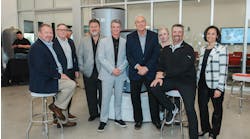by Bob Miodonski
Of Contractor's Staff
DEDHAM, MASS. — Richard Trethewey probably is the most recognized proponent of hydronic radiant heating in the United States, as he marks his 25th anniversary this year on the "This Old House" TV program. He joined the plumbing-and-heating industry 30 years ago when he went to work for the family's contracting company, Trethewey Bros., a fourth-generation business started in 1902 in Boston.
Today he divides his time between his manufacturers rep firm, RST Inc., and his numerous television commitments. He recently spoke with CONTRACTOR to discuss the current state — and future — of the hydronic heating industry.
Question: Do you think the U.S. hydronics industry will grow significantly in the next five years?
Trethewey: I think that it will because of the efficiency of hydronic systems. Water is the ultimate transfer medium. We can hold so much more energy in water than in air. If we deliver energy to a building with water, it will allow us to bring other energy sources into the building as well, such as solar and geothermal.
Q:Will energy efficiency become a bigger factor in the U.S. heating market?
RT: Yes, just look at the price of oil. This morning it was $48 a barrel. It was $14 back in the 1970s. The United States has 5% of the world's population and uses a quarter of the energy, and we'll have to pay attention to this. External forces will makes us be smarter.
If you look at this whole Mc-Mansion thing, it is just crazy with seven or eight furnaces in a house, all oversized for the coldest day of the year. If we could put radiant in the house where it belongs, along with hydro-air and baseboard where they belong, we could be much more efficient.
Q: What else will drive the growth?
RT: Comfort will be the other driver. With this whole nesting approach, everyone is investing in their castle and their space. And they won't compromise. This is the end of the most extraordinary population growth in U.S. history, the baby boom generation that started in 1946. There is this extraordinary wealth and bubble of population.
Q: What will be the obstacles to growth?
RT: The whole disposability idea in America where we roll over the property every four years. If you're staying in the building, it makes every lick of sense to invest in efficiency.
Q: What technology changes do you foresee?
RT: The whole building will be smart on different levels. Every building will know how hot or cold it is outside and will dial in accordingly. The whole idea of Widow Jones living in a house with a single Honeywell thermostat is going to have to change. If the Widow Jones' heating bill goes from $1,500 to $4,000, there will be a great opportunity for contractors to zone her house. There will be sensors in rooms that will feel people when they come into them and adjust the temperature accordingly — wireless, infrared or smart technology that will dial the room up or down.
There will be a monstrous business opportunity in carving up these McMansions. They'll become a pink elephant. We'll carve them up into multi-units or tear them down.
Q: Any other new technology?
RT: Geothermal is inevitable. There's more energy below the surface of the earth than we need. It's just a matter of how difficult it is for us to get it out. There's a very narrow band of contractors who know how to do this kind of work right now.
Q: What will be the biggest challenges facing hydronic heating contractors?
RT: I can't imagine a more exciting time to be in the heating industry than right now. Fossil fuels are running out and getting more expense. Fossil fuels will be gone by the end of my business life, or certainly by the end of our children's business lives, and what opportunity will that be?
The thing that will be the Achilles heel is this crazy cowboy mentality in the hydronics business where every job is different. It's hard to screw up hydronics because you can do it in so many ways and still have the system deliver heat. You see these systems that only the original designer knew what he was doing. The lack of repeatability is a huge problem. The next guy who comes in just carves up the old system and badmouths the guy who did it. This gives hydronics a bad name. We saw the same thing happen in solar.
Q: Will home centers become a bigger player in the radiant heating market?
RT: I hope not. If that happens, it just has no quality guarantee. It's bad enough now that everybody thinks he's a radiant expert. We're installing this heating system right into the building itself, so we have to get it right. If we don't, the hot-air duct guys win and we get a black eye.
Q: Who will take the lead in educating hydronic heating contractors?
RT: The answer is I don't know. We are missing an entire generation of people entering the skilled trades. In 1967 a guidance counselor somewhere came up with the new definition of success, which was to get a liberal arts degree. Vo-tech got to be a dumping ground for guys who didn't do well in school. The average age in the plumbing industry right now is 45 to 50 — at a time when the baby boom generation is looking for people to work on buildings.
Quite often, the vo-tech school is sitting there collecting dust, and it needs to be regenerated. Or we need to retool people from other industries. We see layoffs in other industries at the same time that we're looking for people.
Rep firms do a lot of training but they usually push a particular product line. Associations do education by committee, and it tends to get watered down. I'm not sure where the education will come from, but I hope to be a part of it.
Q: What other issues face the hydronics industry?
RT: The biggest issue is a global issue. I've read two books lately, and they've changed my outlook. One is "Out of Gas" by David Goodstein. The other is "The Party's Over" by Richard Heinberg. That one is probably the better one from a readability viewpoint. In it, he discusses Hubbert's Peak. Back in the 1940s, Hubbert wrote that we would reach our peak in getting oil out of the ground in 1970. Everyone laughed at him, but we're on our way down in our production of fossil fuels. And our consumption is going up at a rate that is mind boggling. This fossil fuel will go away.
This is an opportunity in the comfort business, and what other industry has this kind of opportunity? This is the most intriguing time in history to be in the heating business. How do we keep these buildings from freezing and keep people from dying?
I don't want to sound like Chicken Little, but there's so much to do, so much opportunity right now.

